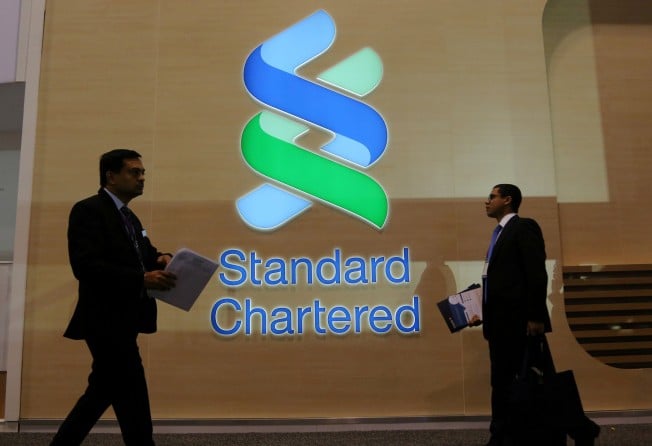Standard Chartered’s first-quarter profit rises 2 per cent as weak markets, lower wealth management weigh on earnings
- Pre-tax profit ahead of expectations of analysts surveyed by Bloomberg
- Bank to begin US$1 billion share buy-back programme

Standard Chartered said on Tuesday its profit rose 2 per cent in the first quarter, as a weak market environment and lower wealth management activity weighed on its results and trading revenue at its closest banking rivals.
The bank, one of three lenders authorised to issue Hong Kong’s currency notes, reported a profit of US$818 million in the first quarter, compared with US$803 million in the same period a year ago.
In the quarter, Standard Chartered took a previously announced charge of US$186 million after it agreed in April to pay US$1.1 billion to end long-running investigations by United States and United Kingdom authorities into its processing of transactions by entities with connections to Iran while the country faced US sanctions, and its financial crime controls.
“Our first-quarter profit supports our belief that we will generate full-year returns of at least 10 per cent by 2021,” Standard Chartered’s chief executive Bill Winters said. “The resolution of our legacy conduct and control issues means we can now manage our capital position more dynamically.”
The bank also said it would begin a programme to buy back US$1 billion worth of its shares. Its last share buy-back was more than a decade ago.
The emerging markets lender, which is based in London but generates much of its revenue in Asia, reported a pre-tax profit of US$1.24 billion in the first quarter, which was ahead of analysts expectations according to Bloomberg.
On an underlying basis, an important measure for the bank, profit before tax rose 10 per cent to US$1.38 billion.
Standard Chartered’s shares rose as much as 7 per cent in Hong Kong following the announcement. Its shares ended the day up 6 per cent at HK$71.10.
Weak trading and slower mergers and initial public offerings activity have hit banking industry results in the quarter, particularly at competitors who have made big bets in Asia.
UBS chief executive Sergio Ermotti said that it was “one of the worst first-quarter environments in recent history” days before the Swiss bank reported a 27 per cent drop in its first-quarter results.
Credit Suisse said income before taxes from its Asia-Pacific business fell 22 per cent in the first quarter as the bank reported double-digit drops in its equity sales and trading revenue and its advisory and underwriting revenue in the region.
Trading revenue also declined sharply at US rivals Citigroup, Goldman Sachs, JPMorgan Chase and Morgan Stanley.
In the first quarter, Standard Chartered said operating income – similar to revenue in the US – declined 2 per cent to US$3.81 billion. Net interest income, however, increased 4 per cent to US$2.27 billion in the first three months of 2019.
Its corporate and institutional banking business reported a 3 per cent increase in operating income to US$1.79 billion in the first quarter, driven by a “strong performance” in its transaction banking operations. Operating income declined 6 per cent to US$1.27 billion in its retail banking operations in the quarter.
Standard Chartered said operating income in its wealth management business was down 14 per cent in the first quarter “reflecting the relatively more buoyant market conditions in the first two months of 2018”.
The company said operating income declined 2 per cent in its China and North Asia business because of less buoyant conditions in wealth management, and income in its Asean and South Asia operations was down 3 per cent because of weaker activity in wealth management and financial markets.
The bank said the global macroeconomic outlook remains uncertain, “but there were encouraging signs of improvement in sentiment towards the end of the first quarter”.
Despite the weaker environment, Winters said the bank’s executives remained confident “in our ability to execute the strategy and create long-term shareholder value”.
Since joining the bank in 2015, Winters has aggressively trimmed the bank’s costs, flattened its management and cut thousands of jobs as part of an ongoing turnaround. The lender returned to a profit in 2017 after two years of losses amid its restructuring.
In February, the bank said it planned to shed an additional US$700 million in costs over the next three years as its seeks to improve its return on tangible equity (ROTE).
The bank has a target for ROTE of at least 10 per cent by 2021. Its ROTE, on an underlying basis, was 9.6 per cent at the end of the first quarter.
Standard Chartered, along with its joint venture partners HKT, PCCW and Ctrip, received one of the first virtual banking licences to be granted by the Hong Kong Monetary Authority this year.
Resolving regulatory inquiries into past conduct by the lender also has been a key focus for Winters since he replaced Peter Sands about four years ago.
Standard Chartered first reached an agreement with American authorities in 2012 over accusations it helped conceal thousands of transactions by entities in Iran and other countries facing US sanctions, but has continued to be dogged for years by regulatory issues.
The bank has agreed to pay more than US$2 billion in penalties and forfeiture since 2012, but hopes the latest settlements can draw a line under the heightened scrutiny it has faced from regulators.
“We are reasonably comfortable that we are now done,” Andy Halford, the bank's chief financial officer, said, referring to regulatory scrutiny over its past conduct.